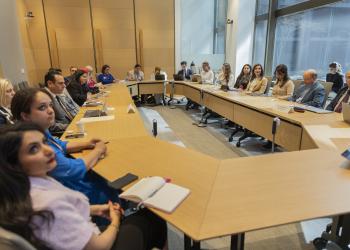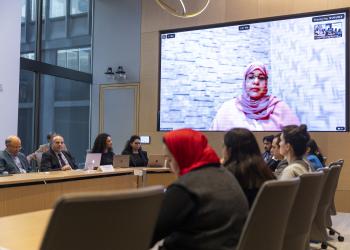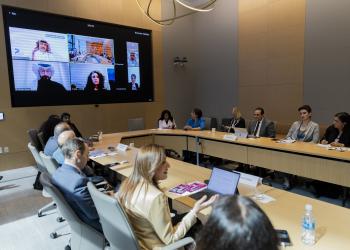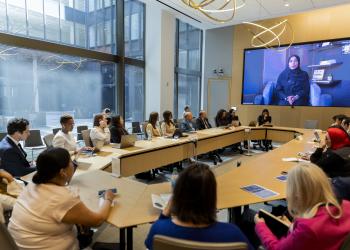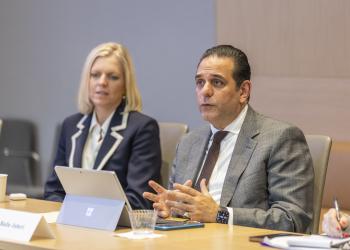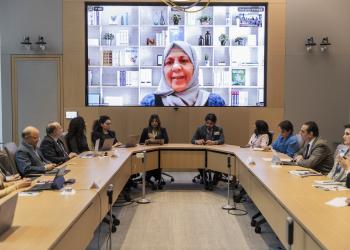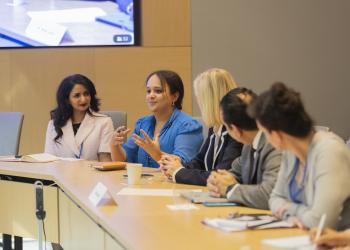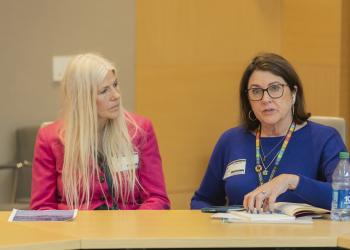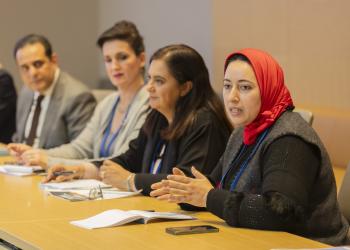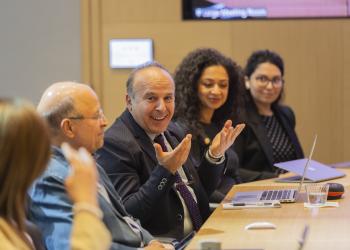BIC Hosts Arabic-Language Event Exploring Institutions and Gender Equality in the Arab Region
How do themes of gender equality and harmonious coexistence find expression in the social, institutional, and grassroots realities particular to the Arab region?
This was among the themes explored at an event organized by Arab members of the Baha’i International Community’s (BIC) delegation to the 68th session of the United Nations Commission on the Status of Women, taking place March 11th to 22nd.
Titled “Empowerment Through Institutions: A Collective Approach to Gender Equality,” the event was held in Arabic and featured speakers from the United Arab Emirates, Bahrain, and Tunisia. Drawing insights from a range of professional backgrounds—including academia, policy research, media, and social services—the featured panelists reflected the richness and diversity of the Arab region itself.
Around 85 participants joined the event, from a variety of Arabic-speaking countries.
Integrating principles of gender equality into one coherent conceptual framework is key to supporting effective action at the grassroots level, said Dr. Roeia Thabet, a representative of the Baha’is of the United Arab Emirates, who moderated the event.
“Organizing efforts around such a framework will ensure that there are basic laws, principles, and common elements between different lines of action,” Dr. Thabet explained. “This allows us to advance well-being and to learn from various approaches without falling into blind imitation.”
Panel speakers addressed a variety of issues related to gender equality in the Arab region. Dr. Wajeeha Al-Baharna, Founder and Vice President of the Bahrain Women’s Society for Human Development, focused on linkages between progress in gender equality and the advancement of all segments of a population.
“We are all partners in humanity, all of us partners bringing our communities forward,” Dr. Al-Baharna said, noting the particular benefit of committees recently established by the government of Bahrain, which set standards and policies to assist women and advance gender equality. “We must live together with human morals and standards that will create a world that will be characterized by coexistence, peace, love, and diversity.”
Translating principles of gender equality into action by means of the institutions of government was a theme stressed by several speakers. Dr. Najia Al Ketbi, Assistant Professor at the Mohamed Bin Zayed University for Humanities, described the experience of the Gender Equality Council of the United Arab Emirates, established in 2015, in this regard.
“The speciality of this Council, and what has helped it bring about equality, is that it reviews existing legislation and policies, in order to help the advancement of women,” Dr. Al Ketbi explained. “It also creates new policy and legislation.”
Speaking from a North African perspective, Dr. Mohamed Ben Moussa, a representative of the Baha’i community of Tunisia, noted that institutional reforms must be accompanied by and embedded in wider transformations in society.
“We have to think about how traditions, culture, and patterns of thought are formed at the level of society,” Dr. Ben Moussa observed. “There are many noble values in society, but also many customs that bring down the level of women. We need to understand gender equality at the level of institutions, at the level of communities, and at the level of individuals, alike. Unless gender equality is well established, neither men nor women will advance.”
Ms. Ayesha Khalfan Al Remeithi, Research Department Director at Trends Research & Advisory, in the United Arab Emirates, drew attention to the importance of tending to the well-being of women and men alike, and in relation to one another.
“We need to be actively looking into the needs of both women and men,” Ms. Al Remeithi said, “to be able to bring coherence between the policies set for each and whether institutions … have the proper balance between the needs of each.”
Concluding the panel speakers was Dr. Badie Jaberi, Chairperson for the Baha'i Social Society of Bahrain, a religious NGO, who reiterated the beneficial role that governmental institutions can play in creating conditions that foster advances in gender equality.
“The openness and intellectual and social enlightenment of institutions of government across Bahrain have created an environment that is very accommodating and welcoming of the contributions of every single person of the community,” Dr. Jaberi said. “At this vital moment in human history, it is important that we arise within our culture and our habits, and use them in a positive way, to bring about more participation among women and girls.”
Open discussion among event participants touched on many additional topics relevant to gender equality in the Arab region—topics such as institutional accountability, conceptions of masculinity, and the education of children. Emphasized by multiple speakers was the preeminent role played by the family, in shaping conceptions of both men and women.
“In hundreds of experiences across the world, family is the main axis where equality begins,” observed Mamdoh Alrouhani, from the Center for Social Prosperity Studies. “The main laboratory for the empowerment of women, the main place where morals are instilled and established, is in the family,” Mr. Alrouhani added, noting that examples of progress have been particularly evident in Saudi Arabia, Bahrain, and the UAE.
The event was part of the BIC’s larger engagement at this year’s Commission on the Status of Women. The BIC’s formal statement to the Commission is available in both Arabic and English. Updates on the delegation’s activities at the Commission can be found here.
